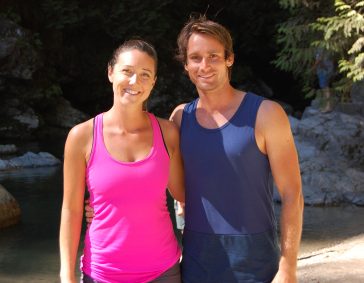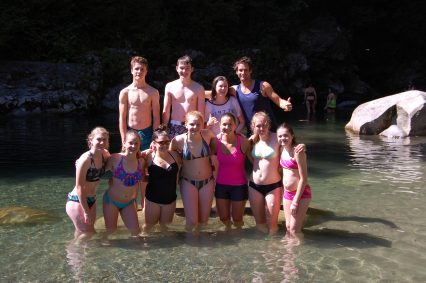Unique North Shore camp teaches youth with Type 1 diabetes how to have fun while managing complex condition
It’s a hot Thursday afternoon in early August and a group of nine teenagers is about to dive into the clear, cool waters of Lynn Creek in Lynn Canyon Park but VCH clinical dietitian Christie Bowles beats them to it. There are cheers and laughs all around as the rest of the group wades into the water.
These are typical teens except for one difference. They all have Type 1 diabetes and are part of a unique North Shore summer camp – by Christie and diabetes mentor Steve Lang ‑ that teaches them how to manage their blood sugars around exercise, food, illness, stress and adrenaline highs in real-life environments.

Camp leaders Christie Bowles, VCH clinical dietitian, and Steve Lang, athlete ambassador for people living with Type 1 diabetes.
The teen years are already tough enough to navigate. Add in a complex health condition and there is even more to contend with, like multiple daily blood sugar checks, administering insulin, and carb counting. But Christie and Steve use the camp to show the teens there is no limit to what they can accomplish if they learn to manage their diabetes.
Diabetes management a 24/7 job
“Diabetes management is a demanding 24/7 job with daily expectations that go far beyond that of a teenager without diabetes,” explains Christie, who works at VCH’s North Shore Diabetes Education Centre in West Vancouver. “These youth have to make up to 100 additional decisions each day related to managing their blood sugars. This is on top of the typical highs and lows of just being a teenager.”
Christie and Steve, who is also an athlete ambassador for people living with Type 1 diabetes, say a key challenge for teens is applying self-management tasks to real life situations.
“A major challenge for teens is incorporating regular blood sugar checks each day” explains Christie. “We use camp as an opportunity to provide practical strategies to both understand and actively take on more responsibility in self-management. Having a mentor like Steve who has had diabetes for 23 years is great because he can provide examples of strategies he uses each day. We show it is possible to incorporate daily management tasks and still have fun. ”
Highlight of the summer
Now in its sixth year, the week-long day camp was launched in 2011 by longtime VCH dietitian Dianne Allan, who retired last year. With Steve and Christie, who’ve been at the helm since 2012, the camp sees repeat participants thanks to the peer support and camaraderie that happens during the daily outings that include activities like paddleboarding, hiking, and ziplining. The focus is on experiential learning as the camp provides a safe space for educating teens about the latest research and technology.
Mary, 16, has been coming to the camp for all six years.
“This camp is the highlight of my summer,” says Mary, who was diagnosed with type 1 diabetes when she was two and a half.
“One of the biggest reasons I love this camp is I get to be with people who are going through what I’m going through. They help keep me sane and they give me validation. And having Steve with us is huge. He is a vat of knowledge for all of us.”
Steve: “This type of program is invaluable. Having access to mentors and support from your peers is key to living with a chronic condition such as type 1 diabetes. I’m already looking forward to next year.”
From shy to confident
Anne Sarte, Community Programs Lead, NS Chronic Disease Services, says Christie and Steve outdo themselves by finding new adventures for the campers.
“With their commitment to creating a safe, inclusive camp experience, we see how kids who may start out shy or tentative on the Monday can really blossom so that by the end of the week they may be trying carb counting or even temp basals for the first time, buoyed by the encouragement of their peers and support of camp leaders and staff,” says Anne. “Christie and Steve have also grown the junior leadership role for camp these last couple years, which allows a young adult who has recently made the transition to adult diabetes care to act as a role model who can share their personal experiences and practical strategies with campers, too.”
Funded primarily by the Lions Gate Hospital Foundation, the camp runs for one week in August through the North Shore Diabetes Education Centre. Contact Christie Bowles at Christie.bowles@vch.ca for more information.

A group of teens with Type 1 diabetes spent an afternoon in Lynn Canyon Park as part of the week-long diabetes management camp.


Rosemary
As part of the clerical staff at North Shore Chronic Disease Services, it has been amazing to watch the journey of a camper stepping into confidence and self-management with peer support and team work. There is a lot that goes on behind the scenes to create this experience for teens with type 1 diabetes, and I am privledged to be a part of that team.